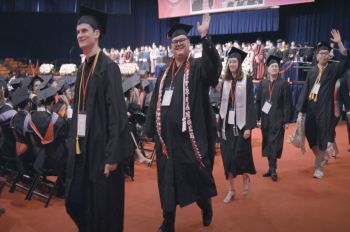IIT researcher finds Baxdelta2 tumor suppressorcan be generated in some colon cancer cells
Discovery may lead to better understanding of microsatellite unstable colon cancer and potentially provide targeted chemotherapeutics for treatment
June 11, 2014 CHICAGO – Illinois Institute of Technology researcher Jialing Xiang, who recently discovered Baxdelta2, the powerful tumor suppressor found only in mutated cells, has learned more about its cell death-causing mechanism and therapeutic implications.
Certain colon tumors with genetic microsatellite instability often lose tumor suppressor Bax due to microsatellite mutation. But a Bax alternative isoform, Baxdelta2, can be “salvaged” from the mutated gene. Xiang has found that Baxdelta2-positive cells are selectively sensitive to chemotherapeutics through an unconventional signaling pathway. This means that colorectal tumors thought to have been “Bax-negative” may instead be able to generate the Baxdelta2 that will be beneficial for chemotherapeutic treatment.
Xiang and her team reported their findings in the journal Molecular Cancer Research. Their work is supported by the National Cancer Institute (NCI) in the National Institutes of Health (NIH).
The pro-apoptotic (cell death-causing) protein Bax is one of the universal tumor suppressors in our body. Loss of Bax will have a negative effect on the cellular “suicide” program and promote tumor development. The ability to generate Baxdelta2 means the cancer cell might be triggered to re-start the apoptotic (cell death-causing) process.
“Discovery of Baxdelta2 will lead us to a better understanding of the ‘Bax-negative’ colon cancer and potentially provide targeted chemotherapeutics for treatment,” said Xiang.
One of the areas that Xiang’s team is working on is to find out how the production of Baxdelta2 is controlled and to identify drugs that can enhance Baxdelta2 production in cancer cells.
Founded in 1890, Illinois Institute of Technology is a Ph.D.-granting university, located in Bronzeville on Chicago's South Side, with more than 7,800 students in engineering, science, architecture, design, applied technology, human sciences, business and law. Total enrollment in Fall 2013 was the highest since 1968—and the Fall 2013 full-time undergraduate enrollment was the largest it has been since 1981. Visit www.iit.edu


![Curiosity Cup Contestants: [From left] Anindya Sinha, Siddhant Iyer, and Sonam Singh](/sites/default/files/styles/width_350/public/2024-05/curiosity_cup_2024-stuart-1280x850.jpg?itok=AIHSPKsK)

